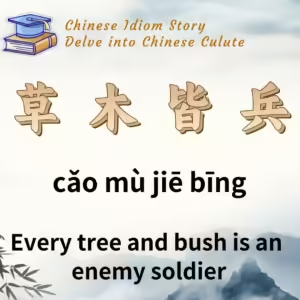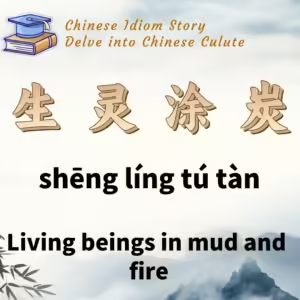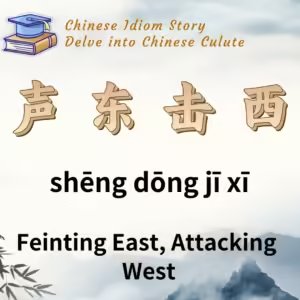
Chinese Idiom: 草木皆兵 (Cao Mu Jie Bing)
English Translation: Every tree and bush is an enemy soldier
pīn yīn: cǎo mù jiē bīng
Idiom Meaning: This idiom describes a state of extreme fear and anxiety, where a person perceives threats everywhere and becomes overly jumpy and paranoid.
Historical Source: “晋书” (Book of Jin), specifically in the biography of Fu Jian.
Idiom Story:
In 383 AD, Fu Jian, the king of the Northern Qin, disregarded the advice of his ministers and decided to lead an army of 900,000 southward to attack the Eastern Jin dynasty. His brother, Fu Rong, commanded a vanguard of 250,000 troops, successfully capturing Shouchun (modern-day Shouxian, Anhui Province).
The Eastern Jin dispatched a combined force of 70,000 troops, led by generals like Xie Shi, to the front lines to confront Fu Rong’s army. Among them was General Liu Lao Zhi, who, with 5,000 elite soldiers, launched a nighttime raid on the camp of Liang Cheng, a general of Fu Jian. The attack resulted in a significant victory, with Liu Lao Zhi killing Liang Cheng and several other commanders, along with over 15,000 soldiers from the Northern Qin.
As the Eastern Jin forces pressed their advantage, Fu Jian and Fu Rong climbed to a tower in Shouchun to observe the enemy troops. They saw that the Eastern Jin army was well-organized and prepared for battle. Looking northward toward Mount Baigong, Fu Jian noticed the grass and trees appearing like human figures. He turned to Fu Rong and exclaimed, “These are all formidable opponents! How can one say there are so few?” His face reflected a mix of despair and fear.
This moment in history, particularly the observation of the grass and trees appearing as soldiers, gave rise to the idiom “草木皆兵,” which captures the essence of paranoia and heightened sensitivity to perceived threats, illustrating how fear can distort one’s perception of reality.






